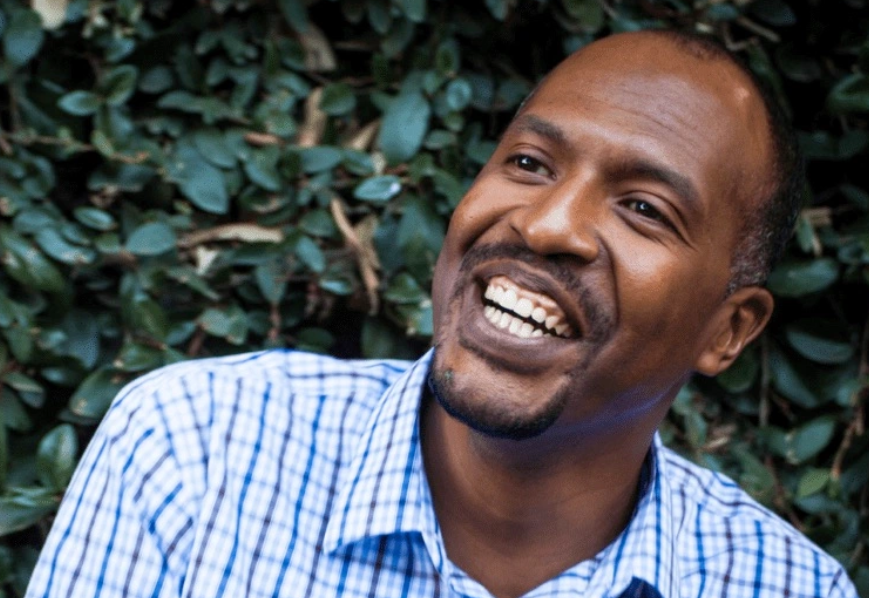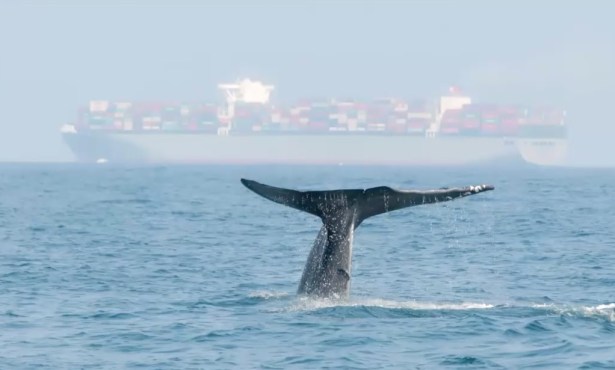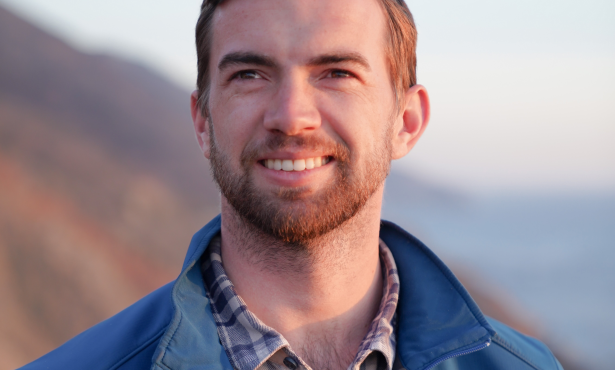James Joyce III Says He Is Running for Mayor
Coffee with a Black Guy Founder Throws Hat into Ring

[This article originally ran at Newsmakers with Jerry Roberts.]
Entrepreneur James Joyce III, founder of the Coffee with a Black Guy anti-racism project, confirmed on Sunday that he is running for mayor of Santa Barbara — saying his appreciable communication skills position him to provide fresh and unifying leadership at City Hall.
“Absolutely,” he said in a Newsmakers interview. “I’m running to be the mayor of Santa Barbara, to help us move forward in a better fashion.”
“I’m all in,” he added.
Joyce plans a formal announcement of candidacy this week.
Calling himself a “cultural conduit,” he told us that he would use his “skill set” as a facilitator and consensus builder to help ease the current petty divisions at City Hall and bring together warring community stakeholders to find solutions to Santa Barbara’s chronic problems, from housing to State Street’s restoration.
Born and raised in Maryland, the 40-year-old candidate graduated from Ohio University in journalism, then worked as a newspaper reporter for seven years, before losing his job amid industry-wide cutbacks in 2009. Moving to California, he worked for a time as an aide to then-Assemblymember Das Williams and moved on to become the longtime district director for Hannah-Beth Jackson, when she served in the State Senate.
In 2016 he founded the Coffee with a Black Guy program, which brings together people from all parts of the community in a safe space for direct and frank conversations about race and racism.
Collectively, these experiences have equipped him, Joyce said, with the personal, professional, and political prowess and capabilities to use the mayor’s office as a listening platform and bully pulpit to help craft practical solutions to seemingly intractable problems.
“It’s mostly about building community — that’s what I’ve done, both on the legislative side and on the entrepreneurial side,” he said. “I’ve got a track record of listening to folks, both as a journalist and as a public servant, listening to folks who are entrusting me with their stories and figuring out how to help them along the way. And I think these are very transferable skills to helping to lead a city.
“And so it’s really an opportunity to bring all the stakeholders to the table and really communicate about, ‘Okay, what are the problems, what are the challenges, and how can we work collectively to solve the problems?'” he added.
State of Play. Joyce is the second major challenger to emerge against Mayor Cathy Murillo, who is seeking reelection. Longtime Planning Commissioner Deborah Schwartz announced her candidacy on Newsmakers several weeks ago.
Murillo four years ago won the key endorsement of the county Democratic Party, but Joyce is politically well-connected from eight years working for Jackson and for Williams before that, and said he intends to seek the party’s support.
Under the city’s system of district elections, the mayor is the only elected official who runs citywide; despite this, the charter requires the mayor to capture only a plurality — not a majority — vote, so whoever finishes first in the field is the winner.
Murillo won last time with just 27 percent of the vote, and conventional wisdom says that the more candidates in the race, the more she benefits, given her proven political base.
In our conversation, Joyce mostly avoided direct criticism of the incumbent, instead emphasizing his own background and experience to offer a glimpse of his leadership style.
“The past few years here in Santa Barbara have been riddled with disaster after disaster, challenge after challenge, and we’ve kind of lost our footing a bit,” he said. “And we’ve seen how that plays out on State Street, in other elements of the business community, as well as in other social aspects.
“We’ve got a great city. We’ve got a lot of great assets here in town,” he said. “We just need to line them up, connect the dots, and start steering in the direction that can make us shine, to be the city we really are.”
Some key excerpts from the wide-ranging interview:
On growing up in Westminster, Maryland. “It’s a predominately white community, relatively conservative. During the time I grew up, my high school was riddled with a large heroin issue, so there were a lot of my friends who either got hooked on that, OD’d, different things like that.
“I wouldn’t say it was a tough upbringing; it was a fairly open and accepting community. It was a more agricultural community, and so it may surprise folks to know that as a child I was a member of the 4H Club, and I even was a director at 4H camp. So growing up in a rural environment, predominately white, it gave me a certain perspective, and that’s what informs the work I’ve done, and that has allowed me throughout my career to kind of be a conduit, a cultural conduit.
“If I’m in a predominately white space, I get it. I’m comfortable in that now, and I can also help that space understand the importance of a diverse mindset, creating an inclusive environment. And those are things that aside from issues of upbringing and race, those are genuine skills that are useful when trying to achieve anything.”
On running for mayor. “It’s going to be very difficult for me to enter a race for mayor and have race not be part of the conversation. Not because I bring it up, but because that’s the society that we live in. And the fact that …representation matters and [the late] Babatunde [Folalyemi] was the first African-American city councilman and there haven’t been any since. So that is part of it.
“There’s something very universal about the experience of Black Americans. We can look at all the advances that have been made in our country because of Black Americans — we got rid of slavery, a systemic institution because of the plight of Black Americans, civil rights became an issue where everybody’s rights were enhanced, because it started with a Black issue. Without making [the campaign] a Black issue, there’s something about that is transferable and instructive for how we move forward into the future.”
On providing leadership. “The powers [of the mayor] as they exist provide a bully pulpit to provide that vision and leadership that the city so desperately needs. It’s an issue of representation and when folks see something that they’re not used to, seeing it creates curiosity and excitement and how do we leverage that as something that can be useful for our city as a whole?
“We’ve had disaster after disaster — we need something to be excited about. We need something to energize us, and I think my candidacy is an opportunity, it is a vehicle and more.… The more inclusive you make folks feel into this thing, the better this thing works for me.
“Everybody I’ve talked to is either excited about the candidacy or [asks] ‘Can I vote now?’ There’s an energy to that. I’ve recognized, and members of the community have recognized, that I’ve accumulated a skill set that can be useful. Members of the community have come to me and said, ‘We would like to see that skill set at a larger level.’ I thought about it, I really considered it, and I’m all in.”
On seeking the Democratic Party endorsement. “I’ve been in communication with party leadership about that endorsement process.… And yes that’s something I’ll be pursuing. It’s an organization that has their ears open, just as other members of the community do about what I can bring and how that might align best with their interests and concerns.
“I definitely have Democratic principles; however, I think that label can often be divisive. We have people in our community who won’t talk because of that label, and so if there’s a way I can help navigate that, help improve those relationships, that will be better for our whole community. Because the superficial things that divide us are really inconsequential when we’re really looking at issues in trying to make us a city that really shines like we should.”
On working in journalism. “The way I looked at being a journalist is, you’re parachuting into this city, and you’re having to learn about the good, bad, and ugly right there as you hit the ground. And as I moved up in the journalism career, you move from market to market, and so each time I would go to a new community, how do I get acclimated and rooted into the values of this community, how do I know what stories this community wants to read and wants to know about? That’s a universal skill, particularly in working in public service.
“The gold-star skill from journalism is having to re-create your core product every day.… When I go in in the morning, I either have to have my own idea or listen to what the editors say is the story of the day, I may or may not know about that thing so I have to get smart on it, do the research, talk to people, interview, gather all the information, go have lunch, come back and synthesize all of that information in an article that’s written at an 8th grade reading level and is engaging and is 100 percent accurate. I think when you have standards like that, day after day, it starts to kind of sharpen your skills a little bit and you start to be able to funnel out all the inconsequential things and focus on the things that matter. That’s a skill that’s extremely valuable as you move into public service.”
On being a Black reporter covering a white community. “That was the unwritten burden. My first job in Marian, Indiana, before I had my name published on a byline, I was in an article because myself and another African-American reporter were hired at the same time. Before we even got to go through orientation the first day, we became a story. Why? Because the other reporter faced housing discrimination — she was trying to get a house for her family, and the landlord said he wouldn’t rent to a Black person, and so that became a story .
“And so the burden of race has always been on my shoulders — that air of representation. When I went to the Ventura County Star as an intern in my last year of college, one of my assignments was to reach out to the local NAACP chapter and find out some information about what we should be covering — because they had nobody to reach out to that community to make those connections. So that was a large part of the work as a journalist.”
On founding Coffee with a Black Guy in 2016, following the widely publicized killings of several Black men by white police officers. “There was such a reluctance, and somewhat of a complacency, to not have to address those issues here in our community. So I’m walking down State Street, I’m walking around, and I see folks in my community actively not making eye contact because — I can only assume why.
“So I was like, ‘All right, let’s stop being silly. Let’s go ahead and provide an opportunity to have these conversations and see where they go from there.’ It’s rooted in the idea that there’s something very universal in the Black American experience and being able to share that experience, in a context when a lot of folks tend to retreat into their silos and their echo chambers. This just provides an opportunity to break out of that and build community.”
On Mayor Cathy Murillo being called out at S.B.’s Black Lives Matter/Healing Justice protest. “There were some missteps made by the mayor in that incident, tapping into what I saw as a little bit of cultural incompetence, not really knowing the tune of what this thing really is locally and how that fits into the larger national picture. I think there were potential missteps there.…
“I had nothing to do with the organization of [the demonstration]. That was all Krystle [Farmer] and Simone [Akila] and the folks they surrounded themselves with. I was just there as a supportive community member, and then they offered me an opportunity to speak because I had been working with an organization down in Ventura County, which actually had been working with a cousin of George Floyd.”
On the council’s efforts to meet the BLM demand for more civilian oversight of SB policing. “On the front of this process, it would have been smart [to] make sure you put some money behind marketing it and making sure that there are individuals in the community that know this is an opportunity. There were a lot of folks who felt left out.…
“Moving forward into the citizens review committee is a collaborative effort. Making sure that the folks who had hurt feelings throughout that process feel welcome to the conversation. And again that early, front-end outreach — the more outreach you do, the more diverse applicants you’re likely to get. How does the community, short of council meetings, really get to engage and have their voices heard?”
On housing. “There was a guy who ran for something a couple years ago and his entire campaign was, ‘Rents are too damn high!’ That’s not me, but rent is too high for a lot of working folks in our community, including me. So finding ways to mitigate that
“Do I have a totally cooked idea on what we need to do to try to solve the problem? Absolutely not. But I can guarantee you one thing — all the elements that we need to solve that problem are right here in Santa Barbara.”



